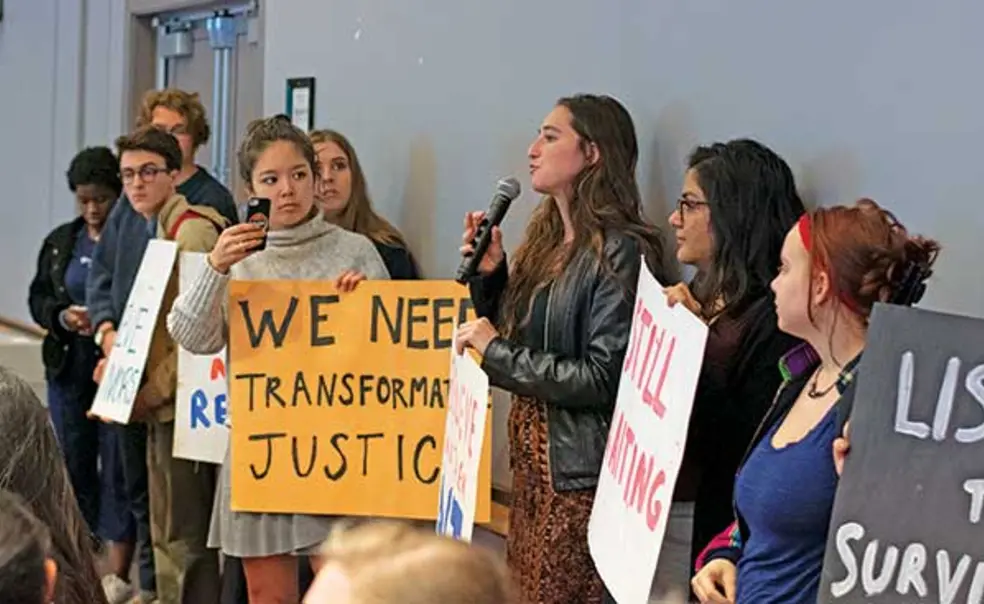On the Path to Reform: As Title IX Evaluations Are Released, Students Continue Efforts for Change
With the public release of two reports and an hour-long discussion at the Nov. 11 CPUC meeting, Princeton outlined its response to calls by students to reform the University’s handling of sexual-misconduct cases.
“Our shared goal is to ensure that Princeton remains a safe and welcoming place where all of our community members can thrive,” Provost Deborah Prentice wrote in a letter to the University community. “Meeting that commitment requires us to make improvements when and where we can, and to learn from our past practices and the best practices of others.” She said recommendations for action in key areas should be proposed by the end of December.
One report was completed by an external committee made up of Title IX experts from three other universities to review Princeton’s practices and procedures. They found Princeton “has a strong Title IX infrastructure” but added, “some students feel that their needs are not being met.” The other report was completed by an internal committee composed of members of the University Student Life Committee and the Faculty-Student Committee on Sexual Misconduct.
Prentice said efforts would focus on four areas where both groups agreed “the University could and should do more.” They are: enhancing the resources offered to students involved in sexual-misconduct cases; changing the investigation, adjudication, and appeal process of Title IX cases; expanding training and communications to create “a more positive campus climate and culture around issues of sexual-misconduct”; and exploring alternative procedures and practices for resolving cases outside Title IX procedures.
An external committee made up of Title IX experts from three other universities found Princeton “has a strong Title IX infrastructure” but added, “some students feel that their needs are not being met.”
Members of Princeton Students for Title IX Reform, which led a nine-day sit-in in front of Nassau Hall in May over the Title IX issue, said in a statement that the reports were “incomplete and biased” and cited a number of shortcomings.
Students said the reports failed to address funding specifically for low-income students with mental-health needs, provide funding for various support services, and include input from students who have firsthand experience with the Title IX process. “How can you conduct a review when you don’t talk to the people directly affected by the implementation of Title IX?” asked Aisha Tahir ’21, one of the group’s members.
In their statement, students described the external review as “extremely disappointing,” saying it gave too much emphasis to administrators’ perspectives. They also criticized the reviewers for challenging students to find ways to implement their proposals.
In contrast, students said there are parts of Princeton’s internal report that they would be “excited to see come to fruition.” Tahir said students will continue to press the University to act on changes that have been proposed.
The internal review group offered 19 recommendations, among them:
- Restructuring the Title IX office to allow the director to focus on oversight
- Providing more training to discourage retaliation and reassessing the current definition of retaliation
- Expanding help for students in navigating Title IX investigations and appeals
- Streamlining the procedures to apply for student mental-health funding and determining if funds are adequate
- Providing more alternatives to the full disciplinary process and studying examples of paths for restorative justice, defined as “a non-adversarial approach to addressing offensive behavior that seeks to identify and repair harm and rebuild trust through facilitated dialogue.”
The internal committee recommended establishing a Restorative Practices Working Group to research areas including the “creation of safe spaces, building trust, attending to trauma and resilience, and setting community standards and norms.” The committee noted that nondisciplinary options, including informal mediation, are available through the University’s Ombuds Office. The group’s report also said it is unclear whether restorative justice is permissible under federal Title IX regulations. Restorative justice was one of the original demands brought forth during the Princeton IX Now student protest.
READ MORE: The full reports released by the University can be found at http://bit.ly/TitleIXreports. The response by Princeton Students for Title IX Reform can be found at http://bit.ly/PIXR-statement.
Prentice said the CPUC would act at its Dec. 9 meeting to create a new ad hoc Committee on Sexual Climate, Culture, and Conduct to replace the Faculty-Student Committee on Sexual Misconduct. The change will formalize the group and expand its oversight to monitor progress and provide input on Title IX-related matters, as well as broader efforts to improve campus climate and culture.
Both reports pointed out that the U.S. Department of Education’s Office for Civil Rights may change its Title IX policies, and that this could affect the University’s policies and procedures.












No responses yet